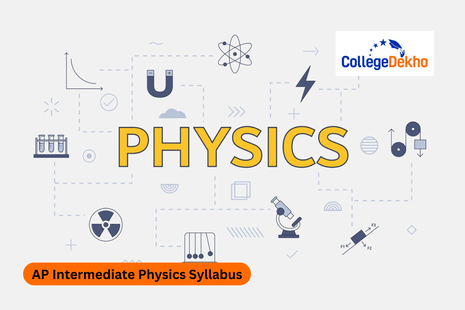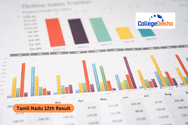

Never Miss an Exam Update
AP Intermediate Physics Syllabus 2024-25: The Board of Intermediate Education, Andhra Pradesh has released a detailed syllabus for Intermediate students. Students can check out the syllabus for each of the subjects online provided in PDF format. AP Intermediate Physics Syllabus 2024-25 includes 7 units and 16 chapters in total. The students from Science stream can check out the detailed syllabus included in this article. They can go through the sections included in the syllabus.
The theory exam of AP board Intermediate Physics is worth 80 marks. It includes 12 questions of 0.5 marks, 8 questions of 1 mark, 8 questions of 2 marks, 5 questions of 4 marks. Students can prepare for each type of question accordingly. To prepare for the exam, students can go through the AP Intermediate Physics Syllabus 2024-25 available online. They can get the link to download the syllabus in English and regional language.
AP Intermediate Physics Syllabus 2024-25: Download PDF
Check out the link below to get the AP Intermediate Physics Syllabus 2024-25 PDF.
AP Intermediate Physics Syllabus 2024-25 Course Structure
Chapter 1 - Waves
- Introduction
- Transverse and longitudinal waves
- Displacement relation in a progressive wave
- The speed of a traveling wave
- The principle of superposition of waves
- Reflection of waves
- Beats
- Doppler effect
Chapter 2 - Ray Optics and Optical Instruments
- Introduction
- Reflection of Light by Spherical Mirrors
- Refraction
- Total Internal Reflection
- Refraction at Spherical Surfaces and by Lenses
- Refraction through a Prism
- Dispersion by a Prism
- Some Natural Phenomena due to Sunlight
- Optical Instruments
Chapter 3 - Wave Optics
- Introduction
- Huygens Principle
- Refraction and reflection of plane waves using the Huygens Principle
- Coherent and Incoherent Addition of Waves
- Interference of Light Waves and Young’s Experiment
- Diffraction
- Polarisation
Chapter 4 - Electric Charges and Fields
- Introduction
- Electric Charges
- Conductors and Insulators
- Charging by Induction
- Basic Properties of Electric Charge
- Coulomb’s Law
- Forces between Multiple Charges
- Electric Field
- Electric Field Lines
- Electric Flux
- Electric Dipole
- Dipole in a Uniform External Field
- Continuous Charge Distribution
- Gauss’s Law
- Application of Gauss’s Law
Chapter 5 - Electrostatic Potential and Capacitance
- Introduction
- Electrostatic Potential
- Potential due to a Point Charge
- Potential due to an Electric Dipole
- Potential due to a System of Charges
- Equipotential Surfaces
- Potential Energy of a System of Charges
- Potential Energy in an External Field
- Electrostatics of Conductors
- Dielectrics and Polarisation
- Capacitors and Capacitance
- The Parallel Plate Capacitor
- Effect of Dielectric on Capacitance
- Combination of Capacitors
- Energy Stored in a Capacitor
- Van de Graaff Generator
Chapter 6 - Current Electricity
- Introduction
- Electric Current
- Electric Currents in Conductors
- Ohm’s law
- The drift of Electrons and the Origin of Resistivity
- Limitations of Ohm’s Law
- The resistivity of various Materials
- Temperature Dependence of Resistivity
- Electrical Energy, Power
- Combination of Resistors – Series and Parallel
- Cells, emf, Internal Resistance
- Cells in Series and in Parallel
- Kirchhoff’s Laws
- Wheatstone Bridge
- Meter Bridge
- Potentiometer
Chapter 7 - Moving Charges and Magnetism
- Introduction
- Magnetic Force
- Motion in a Magnetic Field
- Motion in Combined Electric and Magnetic Fields
- Magnetic Field due to a Current Element, Biot-SavartLaw
- Magnetic Field on the Axis of a Circular Current Loop
- Ampere’s Circuital Law
- The Solenoid and the Toroid
- The force between Two Parallel Currents, the Ampere
- Torque on Current Loop, Magnetic Dipole
- The Moving Coil Galvanometer
Chapter 8 - Magnetism and Matter
- Introduction
- The Bar Magnet
- Magnetism and Gauss’s Law
- The Earth’s Magnetism
- Magnetization and Magnetic Intensity
- Magnetic Properties of Materials
- Permanent Magnets and Electromagnets
Chapter 9 - Electromagnetic Induction
- Introduction
- The Experiments of Faraday and Henry
- Magnetic Flux
- Faraday’s Law of Induction
- Lenz’s Law and Conservation of Energy
- Motional Electromotive Force
- Energy Consideration: A Quantitative Study
- Eddy Currents
- Inductance
- AC Generator
Chapter 10 - Alternating Current
- Introduction
- AC Voltage Applied to a Resistor
- Representation of AC Current and Voltage by Rotating Vectors – Phasors
- AC Voltage Applied to an Inductor
- AC Voltage Applied to a Capacitor
- AC Voltage Applied to a Series LCR Circuit
- Power in AC Circuit: The Power Factor
- LC Oscillations
- Transformers
Chapter 11 - Electromagnetic Waves
- Introduction
- Displacement Current
- Electromagnetic Waves
- Electromagnetic Spectrum
Chapter 12 - Dual Nature of Radiation and Matter
- Introduction
- Electron Emission Photoelectric Effect
- Experimental Study of Photoelectric Effect
- Photoelectric Effect and Wave Theory of Light
- Einstein’s Photoelectric Equation: Energy Quantum of Radiation
- Particle Nature of Light: The Photon
- Wave Nature of Matter
- Davisson and Germer Experiment
Chapter 13 - Atoms
- Introduction
- Alpha-particle Scattering and Rutherford’s Nuclear Model of Atom
- Atomic Spectra
- Bohr Model of the Hydrogen Atom
- The Line Spectra of the Hydrogen Atom
- DE Broglie’s Explanation of Bohr’s Second Postulate of Quantisation
Chapter 14 - Nuclei
- Introduction
- Atomic Masses and Composition of Nucleus
- Size of the Nucleus
- Mass-Energy and Nuclear Binding Energy
- Nuclear Force
- Radioactivity
- Nuclear Energy
Chapter 15 - Semiconductor Electronics: Materials, Devices and Simple Circuits
- Introduction
- Classification of Metals, Conductors and Semiconductors
- Intrinsic Semiconductor
- Extrinsic Semiconductor
- p-n Junction
- Semiconductor diode
- Application of Junction Diode as a Rectifier
- Special Purpose p-n Junction Diodes
- Junction Transistor
- Digital Electronics and Logic Gates
- Integrated Circuits
Chapter 16 - Communication Systems
- Introduction
- Elements of a Communication System
- Basic Terminology Used in Electronic Communication Systems
- Bandwidth of Signals
- The bandwidth of Transmission Medium
- Propagation of Electromagnetic Waves
- Modulation and its Necessity
- Amplitude Modulation
- Production of Amplitude Modulated Wave
- Detection of Amplitude Modulated Wave
Students can also check the AP Intermediate Physics Syllabus 2024-25 in their regional language. Check out the images below to get detailed information about the syllabus.
How to Download AP Intermediate Physics Syllabus 2024-25?
Students can visit the official website of the AP Board to download the syllabus. Follow the AP steps given below to download the latest syllabus:
- Step 1: Visit the official website of the AP Board at https://bieap.apcfss.in/
- Step 2: Find the “Syllabus and Resources” and click on Syllabus and Question Bank
- Step 3: A list of various subjects will open on the screen
- Step 4: Find your subjects and click on download
AP Intermediate Physics Chapter-wise Marks 2025
The AP Inter 2nd year Physics exam will be given 60 theoretical marks following the paper format and the remaining 40 marks are allocated to practical exams. Check the chapter-wise distribution below:Name of the Chapter | Marks Weightage |
|---|---|
Waves | 8 |
Ray Optics and Optical Instruments | 4 |
Wave Optics | 2 |
Electric charges and fields | 4 |
Electric Potential and Capacitance | 4 |
Current Electricity | 8 |
Moving Charges and Magnetism | 4 |
Magnetism and Matter | 2 |
Electromagnetic Induction | 4 |
Alternating Current | 2 |
Electromagnetic Waves | 2 |
Dual nature of matter | 2 |
Atoms | 4 |
Nuclei | 8 |
Semiconductor Devices | 4 |
Communication Systems | 2 |
AP Intermediate Physics Preparation Tips 2025
Most of the students find the Class 12 Physics subject difficult. This is also due to the vast syllabus and derivations that are there in both parts of the Physics book.- The Physics board exam strictly follows the textbook prescribed by the board as it covers the entire class 12 Physics syllabus. So students are recommended to study from the Class 12 Physics book.
- Important formulas should be readily available to students so they can answer the numerical problems quickly.
- Students must practice each derivation at least thrice so that the exam won’t take much time.
- One required drawing question on the Physics Paper involves either a graph or a device. To receive a perfect score on this question, students must focus on the diagram's salient characteristics.
- Students should solve previous year’s class 12 physics question papers with a time slot of 3 hours. This will prepare their body and mind for the actual examination.
FAQs
After completing the Physics syllabus, students can try solving the sample papers and previous year question papers. With a good idea of the types of questions, it becomes easy for them to understand the questions and answer quickly.
AP board mentions the marks for each of the topics in the subject. Students can go through the marking scheme and check the highest marks allotted to the topic.
Students can visit the official website of the AP board at https://bieap.apcfss.in/ and get the link to download AP Intermediate Physics Syllabus 2023-24.
AP board has released the AP Intermediate Physics Syllabus 2023-24 for students in a PDF format. The students can visit the official website and get the download link for the Physics syllabus.
Was this article helpful?

















